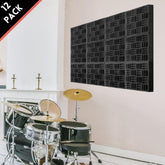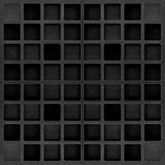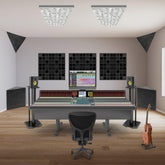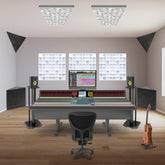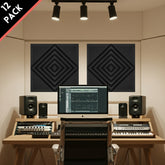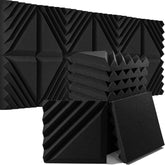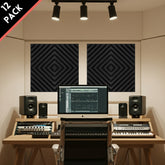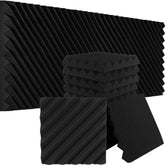Understanding Sound Engineering and Music Production
Understanding Sound Engineering and Music Production

Introduction: Setting the Stage for Audio Excellence
Embarking on an audio journey requires understanding the distinct roles of sound engineering and music production. This guide aims to demystify these fields, providing clarity for aspiring professionals and enthusiasts alike.
Section 1: The Essence of Sound Engineering
Crafting Audio Perfection
Sound engineering is an art and science, focusing on capturing, manipulating, and reproducing sound. It involves technical expertise in handling equipment like microphones, mixers, and recorders. Sound engineers ensure that the audio quality is pristine, whether in a live setting or a recording studio.
Section 2: Music Production – The Creative Process Unveiled
Shaping the Musical Vision
Music production is the creative soul of audio work. It encompasses composing, arranging, and overseeing the creation of a musical piece or album. Producers work closely with artists to shape the sound and style of the music, guiding it from concept to final product.
Section 3: Tools of the Trade – Gear and Equipment
Building Your Sonic Arsenal
Both sound engineers and music producers rely on a range of equipment. In a home studio, tools like acoustic panels, bass traps, and other room acoustic treatments are crucial. These elements ensure that the recording environment is acoustically balanced, allowing for cleaner, more professional recordings.
Section 4: The Role of Technology in Audio Work
Embracing the Digital Age
Advancements in technology have blurred the lines between sound engineering and music production. Digital Audio Workstations (DAWs), software plugins, and virtual instruments are now integral to both roles, allowing for more flexibility and creativity in the audio production process.
Section 5: Skillsets and Knowledge – What Sets Them Apart
Mastering the Art and Science of Sound
While there is overlap, sound engineering typically requires a more technical skill set, focusing on the physics of sound, electronics, and audio technology. Music production, conversely, demands a strong musical background, creativity, and an understanding of musical trends and artist management.
Section 6: The Collaborative Journey – Working Together in Harmony
Fusing Technical Mastery with Creative Vision
In reality, sound engineers and music producers often work closely together. A sound engineer's expertise in acoustics and recording techniques complements a producer's creative direction, ensuring that the final product is both technically sound and artistically compelling.

Conclusion: Charting Your Path in the World of Audio
The realms of sound engineering and music production offer diverse and rewarding career paths. Understanding their differences and interconnections is crucial for anyone aspiring to make their mark in the audio industry. Whether your passion lies in the technical finesse of sound engineering or the creative flair of music production, both roles are pivotal in bringing auditory experiences to life.
With this foundational knowledge, you're better equipped to decide which path aligns with your interests and skills. Whether tinkering with acoustic treatments in a home studio or guiding artists through the production process, your journey in the world of sound is bound to be an exciting one. Let your passion for audio guide you to your niche in this vibrant and ever-evolving industry.
ABOUT AUTHOR
House Live Engineer of Free Bird, a live house with the history of South Korea's indie music scene.
Single album/Regular album/Live recording, Mixing and Mastering experience of various rock and jazz musicians

